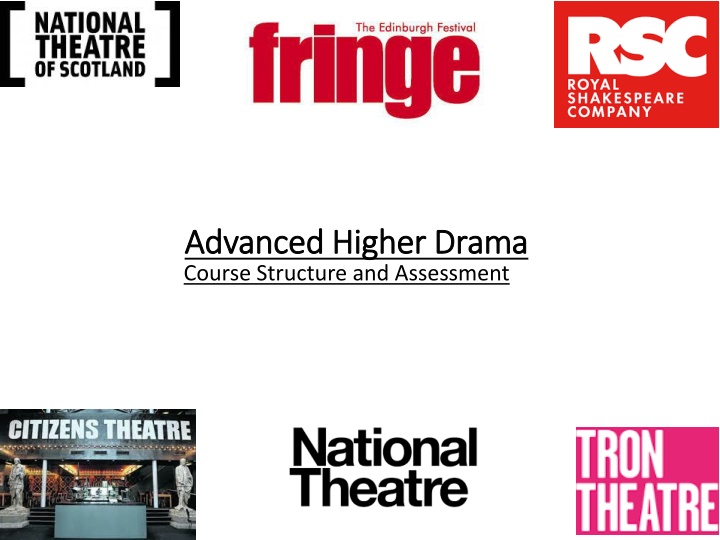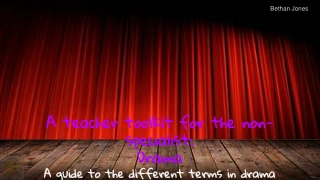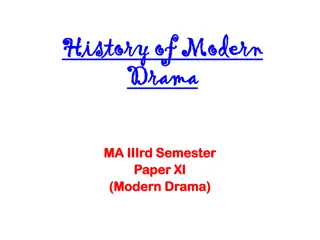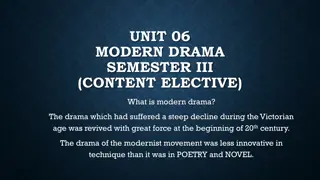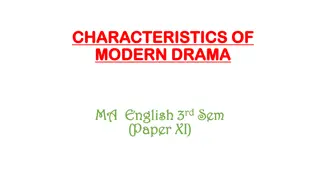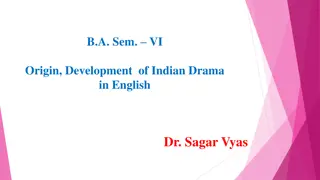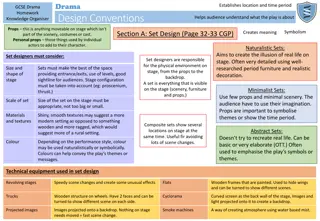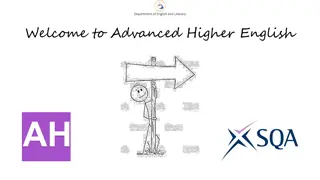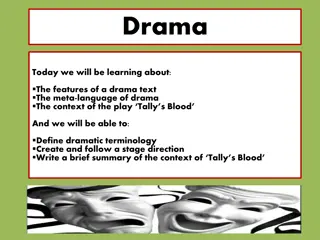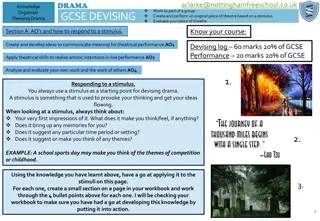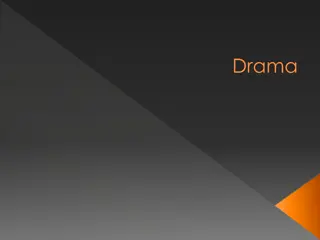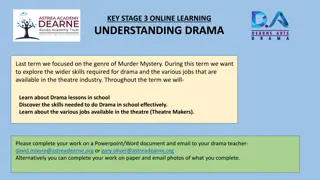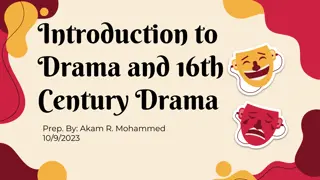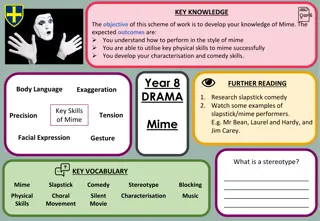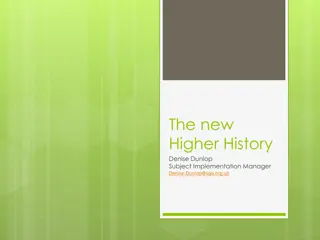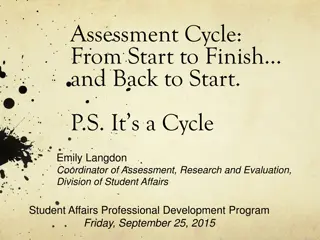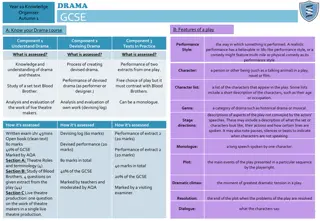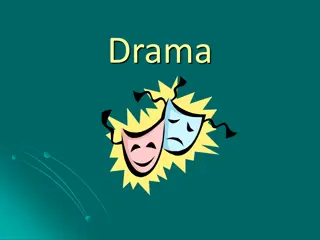Advanced Higher Drama Course Overview: Structure, Assessment & Requirements
This course structure in Advanced Higher Drama involves a project dissertation, an assignment based on a production, and a performance exam. The assessment includes analyzing productions, practical work, and written demands. Entry requirements include achieving a pass in Higher Drama and English, along with independent theater visits. The course aims to develop skills in analyzing theater performance, understanding influential practitioners, and exploring the historical, social, and cultural influences on drama.
Download Presentation

Please find below an Image/Link to download the presentation.
The content on the website is provided AS IS for your information and personal use only. It may not be sold, licensed, or shared on other websites without obtaining consent from the author.If you encounter any issues during the download, it is possible that the publisher has removed the file from their server.
You are allowed to download the files provided on this website for personal or commercial use, subject to the condition that they are used lawfully. All files are the property of their respective owners.
The content on the website is provided AS IS for your information and personal use only. It may not be sold, licensed, or shared on other websites without obtaining consent from the author.
E N D
Presentation Transcript
Advanced Higher Drama Advanced Higher Drama Course Structure and Assessment T THE HE G GLASS LASS M MENAGERIE ENAGERIE
SQA Course Document: structure Three elements will make up your overall assessment: Component 1: project dissertation 30 marks (self selected topic and ongoing investigation) Component 2: assignment 20 marks (1 hour and 30 minutes exam write up on a production from an SQA set question) Component 3: performance exam 50 marks 2x acting pieces. 1 x interactive 18 mins. (30 marks) 1 x monologue 3 minutes (20 marks) Given this there is a massive amount of written work all about analysing productions I will try my best to include practical work as much as possible but there will be less than in higher I think You need an A or B (at the least at higher) to cope with the written demands You will definitely need Higher English in S5
SQA Course Document: structure Three elements will make up your overall assessment: Component 1: project dissertation 30 marks (self selected topic and ongoing investigation) Component 2: assignment 20 marks (1 hour and 30 minutes exam write up on a production from an SQA set question) Component 3: performance exam 50 marks 2x acting pieces. 1 x interactive 18 mins. (30 marks) 1 x monologue 3 minutes (20 marks)
Entry Requirements and watching theatre Entry Requirements and watching theatre Have achieved a pass (grade a or B) at higher Drama and English An agreement pupils will undertake independent theatre visits/ watching screenings (dissertation) plus supported theatre visits/ screenings as arranged by the department Theatre visits will be different this year I imagine. You should watch as much digital content as you can. You need to understand THEATRE and have a good knowledge of PRODUCTIONS to do the assignment and the dissertation.
Purpose and aims Purpose and aims The course enables candidates to explore both the practical and analytical aspects of drama. Candidates investigate how professional theatre practice has been shaped by influential theatre practitioners. The course aims to enable candidates to: develop autonomy and independent thinking skills analyse professional theatrical performance develop knowledge and understanding of professional theatre practice and influential practitioners investigate how theatre practitioners have influenced professional theatre develop knowledge and understanding of historical, social, cultural and/or political influences on drama apply critical, investigative and analytical skills to a performance issue apply creative and critical thinking to synthesise ideas and arguments develop analytical skills in the interpretation of texts develop and extend skills in performing within their chosen area of acting, directing or design develop their skills in devising drama and interpreting complex texts explore how to use theatre and performance skills to communicate effectively with an audience develop creativity when applying skills in problem solving, analysis and evaluation
Course Outline Candidates develop practical skills creating and presenting drama. The course provides scope for personalisation and choice by encouraging candidates to be creative and express themselves in different ways. By exploring and analysing the work of influential theatre practitioners, the course extends the study of the art of professional theatre, its forms and its practices. The course includes: active involvement in devising, creating, appreciating, and using theatre to communicate with an audience the analysis of texts and the study of influential theatre practitioners learning through drama to help candidates appreciate historical, social, cultural and/or political values, identities and ideas. Evaluation of production practitioners: director, actor, designer Evaluation of the self and others contribution towards the production/ drama process
Assessment Assessment- - Component 1: project dissertation (30 marks/ 3000 words) Component 1: project dissertation (30 marks/ 3000 words) Candidates identify a performance issue (something about how theatre is made i.e. impact of design, how violence is portrayed, the effectiveness of the mise en scene or lighting or sound in theatrical communication, the work of a particular director etc.). Candidates carry out research and communicate their findings in a dissertation of 2,500 to 3,000 words. Candidates must acknowledge sources and include visual evidence as appropriate. Candidates choose an aspect of drama that interests them and carry out independent research. The dissertation allows candidates to demonstrate a depth of knowledge and understanding of: influential theatre practitioners and their impact on professional theatre practice performance theories, processes and practices within the context of their identified performance issue Candidates must decide on the focus and nature of their dissertation. The performance issue can be the same, different, or a combination of, the production role candidates use in their performance assessment. Candidates may find some appropriate performance material from discoveries made during their own practice; however, the project dissertation requires candidates to identify alternative perspectives to their own, and to synthesise the evidence from all of their sources to produce a coherent line of argument.
Assessment Assessment- - Component 2: assignment (20 marks) Component 2: assignment (20 marks) The assignment has two stages: research production of evidence Candidates analyse a professional theatrical production and the work of at least one theatre practitioner (actor, director, and/or designer) involved in the production, in an extended response. The analysis could be of a live performance, a live-streamed performance, a recorded live theatrical performance or a historical performance. The performance must be a play: it must not be a musical, pantomime, ballet or opera. Candidates must not use the same theatrical production and/or theatre practitioner that they use in their project dissertation. The assignment gives candidates an opportunity to demonstrate the following skills, knowledge and understanding within a performance analysis context: research and investigate their chosen question within the context of the performance, using sources of information research a minimum of one theatre practitioner involved in the production from an actor, director, and/or designer demonstrate knowledge and understanding of theatre practice and the chosen practitioner in relation to the performance analyse a professional theatrical production in response to the chosen question structure information and present a well-reasoned argument and conclusion, supported by evidence
Assessment Assessment- - Component 3: performance exam (50 marks) Component 3: performance exam (50 marks) 2x acting pieces 1 x interactive 18 minutes (30 marks) 1 x monologue 3 minutes (20 marks) The performance allows candidates to draw on, extend, and apply the skills, knowledge and understanding they have learned during the course. It assesses candidates performance concepts from full-length published play(s). Candidates: creatively explore acting or directing or design concepts within the chosen play(s) respond to themes and issues of the chosen play(s) understand and interpret the historical, social, cultural and/or political context of their chosen play(s) use an advanced range of acting or directing or design skills communicate to an audience In the interactive role, candidates should: communicate an effective interpretation of the text by demonstrating a clear understanding of character through the use of textual and sub-textual clues portray a credible character that expresses appropriate emotions and conveys complex relationships through detailed interaction with other characters demonstrate an appropriate and effective use of voice demonstrate an appropriate and effective use of movement create an impact on the audience In the monologue, candidates should: communicate and portray an effective interpretation of a character through the use of textual and sub-textual clues demonstrate an appropriate and skilled use of voice demonstrate an appropriate and skilled use of movement create an impact on the audience
Skills Developed: Skills Developed: Candidates will develop DRAMATIC AND THEATRICAL SKILLS RESEARCH SKILLS ESSAY WRITING SKILLS LEADERSHIP SKILLS EVALUTION SKILLS INTERPERSONAL AND TEAM WORK SKILLS COMMUNICATION SKILLS SOCIAL AWARENESS AND DIPLOMACY The following provides a broad overview of the subject skills, knowledge and understanding developed in the course: exploring and investigating the influence, theory and practice of influential theatre practitioners identifying and exploring a relevant performance issue analysing and evaluating the impact of key productions by influential theatre practitioners applying creative and critical thinking to synthesise ideas and arguments interpreting the historical, social, cultural and/or political contexts of complex texts analysing and interpreting the role and craft of the actor, director, and designer working independently to produce a theatrical concept applying skills in acting, directing, or design creating and presenting their own theatrical concepts investigating how meaning can be communicated to an audience using a range of complex creative problem-solving, planning and evaluation skills within the creative process
Pathways Advanced Higher drama is of value to those wanting to pursue a career in the creative industries, performing arts, arts management or continue their study of theatre at higher education or application to drama/ theatre training institutions. More generally it would also support applications to a range of further or higher education courses: teaching, law, medicine, psychology, police/ criminology, advertising & marketing etc. plus courses with formal presentation, human interaction and engagement, cultural sensitivity and behaviour at their core. This course encourages candidates to use skills essential for success in many fields. Through the drama process they exercise their imagination and creativity. They develop important skills, attitudes, and attributes including creativity and adaptability, learning independently, critical thinking, perseverance and resilience. Life is- yes- about pathways for the future it is also about learning about life, love, pain and the pursuit of happiness Welcome to advanced higher drama!
